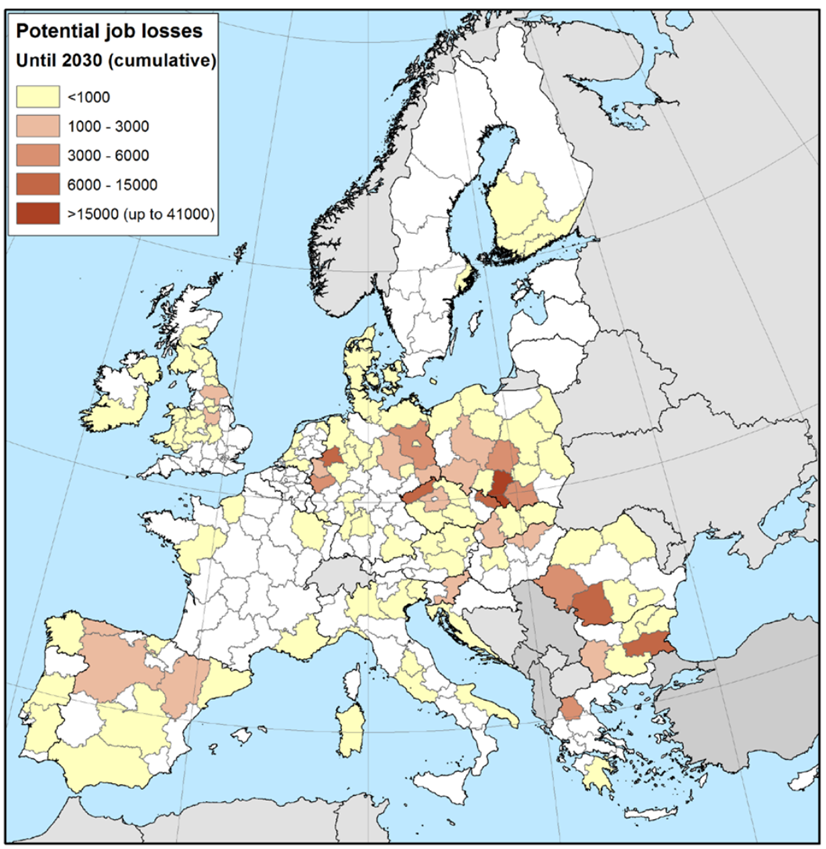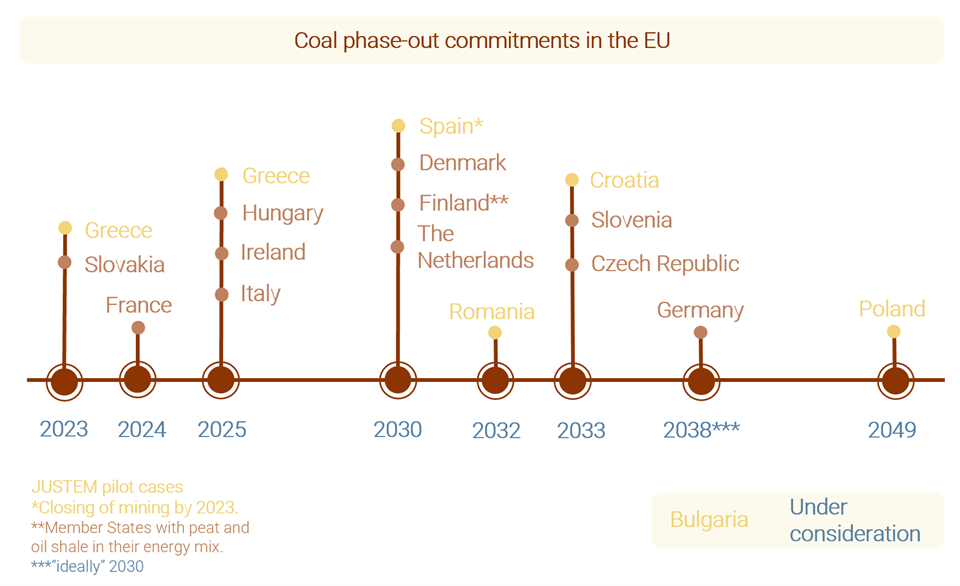By Diana Süsser, IEECP
The city of Katowice has transformed itself from the coal industry-city into the city of the future in recent years. Yet, the wider area of Silesia, as many other European coal regions, is still in the transformation away from coal. Although many European countries have switched on power plants during the energy crisis, the European Union (EU) supports coal regions in their just phase-out. But what is a just transition? And what is the current status of coal phase-out planning in the EU?
Katowice’s transformation
Katowice is the capital of the Silesian Voivodeship in Poland with a strong cultural and industrial heritage. Once associated with mining and heavy industry, the city has been transformed into a modern city of the future. Four years ago, the city hosted the 24th Conference of the Parties (COP23) to the United Nations Framework Convention on Climate Change (UNFCCC). At that time, light installations marked the upcoming change: “Black to Green”.
The citizens, who call their city KATO, are the ambassadors of the enormous changes that the city has undergone. Since 2018, Katowice has been using apps and digital campaigns to engage citizens in the transformation of their city. In the KATOobywatel (KATOresident) project, for example, citizens can contribute their own project ideas for a cleaner, greener and safer city and apply for funding for their project ideas through a (green) participatory budget.
The “Warszawa II” coal mine winding tower is still a landmark of the city but has been transformed into a viewing platform.

It stands on a former Katowice mining site, where the Silesian Museum is now located. Here, the kick-off meeting of the EU Life project “JUStice in Transition and EMpowerment against energy poverty” (JUSTEM) took place from 12 to 13 December 2022. The JUSTEM project supports regional authorities in developing or implementing territorial just transition plans that take local impacts into account and involves citizens in the process to ensure that their needs are addressed.
We did not choose Katowice without reason, as it is in the heart of one of the pilot regions of the JUSTEM project, namely Silesia.
Coal regions in transition
Silesia is one of the 31 coal regions in 11 EU countries. Coal regions generate 20% of the total electricity production in the EU. Total coal-fired electricity generation has fallen by almost a third since 2012 and phasing-out of coal is crucial for the EU to meet its climate and energy targets.
Today, around 230,000 people are employed in coal mining or coal power plants in the EU. Silesia has the largest hard coal mining and accounts for more than two third of total EU coal industry employment in the mining industry. Although the number of mining jobs has been already declining, many more jobs are at risk in these regions by 2030 (see figure below). The expected job losses make it clear that the coal phase-out is not just about reducing carbon emissions. It is also about people, about retraining workers, about creating new economic opportunities, about shaping the future of society.

A just transition from coal
The term “just transition” has become very popular. But what is a “just transition”?
The term originated in the trade union movement and encompassed a range of social measures to secure workers’ rights and livelihoods. Broadly speaking, a just transition aims to support those who are negatively impacted socio-economically from a transition to a green economy, while ensuring that the significant benefits are widely shared. It involves countries, regions, sectors, communities, workers and consumers affected by the transition.
Despite the widespread agreement that a just phase-out of coal must consider different forms of justice, including environmental, social and energy justice, there is still much confusion about what the term means. In recent literature, justice is composed of four key dimensions1:
- Procedural justice concerns that affected parties are meaningfully and continually engaged in the decision-making process;
- Distributive justice is about a fair and equal sharing of costs and benefits of the transition;
- Recognitional justice is about an equal valuing and representation of all members of society and that they have political rights;
- Restorative justice is about redressing past harm and implementing measures to reduce the likelihood of future harm or to compensate for it, for example, implementing transition frameworks for workers from coal industry.
Such a holistic approach to just transition can help identify socio-economic, institutional and socio-technical challenges and develop systemic solutions that enable improvements to regional infrastructure, new employment opportunities and the necessary regional/national resources/financing. Yet, just transitions often focus on technical and economic aspects, while citizens’ voices are not sufficiently considered.
In JUSTEM, we will work with regional policymakers and citizens in six coal regions to ensure that territorial transition plans take into account people’s needs and concerns and develop concrete project pipelines, including projects that address the alleviation of energy poverty. A transition that is fairer for people will ensure that the coal phase-out is accepted and supported by local people.
Phase-out of coal in the EU
Just transitions from coal do not happen from one day to another. Fifteen countries have committed to phasing out coal and have set deadlines (see figure below). These countries include the pilot countries of JUSTEM: Croatia, Greece, Romania, Spain and Poland. Bulgaria is considering a phase-out.

The six JUSTEM pilot regions (Stara Zagora, Bulgaria; Istria region, Croatia; Western Macedonia, Greece; Śląskie Voivodeship, Poland; Jiu Valley, Romania; and Asturias, Spain) and the replication regions (Megalopolis Arcadia, Greece) have a different status of the development or implementation of (just) transition plans.
Territorial just transition plans for Croatia and Bulgaria are pending. In contrast, Greece was the first country to have its Just Transition Fund Programme and plans adopted in June 2022. In the beginning of December 2022, the European Commission had also adopted all five Polish Operational Programmes with Territorial Just Transition Plans. The territorial plan for Silesia and Western Małopolska is worth €2.4 billion under the Just Transition Fund to support a just climate transition in the coal region. The Just Transition Fund is a key element of the Just Transition Mechanism, which includes financing, funding and a just transition platform, that aim to benefit people, businesses, regions and Member States.
The current energy crisis is affecting plans to phase out coal in order to maintain the country’s energy security. In consequence of the Russian war against Ukraine, the EU has decided to reduce its dependence on Russian oil and gas and developed the REpowerEU plan, which consists of three pillars: saving energy, accelerating the transition to clean energy and diversifying energy supply. Many European countries have “re-powered” coal-fired power plants to compensate for the shortage of fossil gas. Romania, for example, has postponed its just previously adopted plan to phase out coal by 2030 by two years, while approving funding to accelerate the development of renewable energy. Germany has just recently postponed the shutdown of two lignite-fired reactors that were supposed to be shut down this year2. This means a slowdown of the coal phase-out, at least in the short-term.
Recent developments thus present a challenge for JUSTEM’s work, but also an opportunity to involve and empower citizens from Silesia in Poland to Asturias in Spain to facilitate just transitions and alleviate energy poverty in the pilot regions.
1 https://www.tandfonline.com/doi/full/10.1080/14693062.2022.2108365


